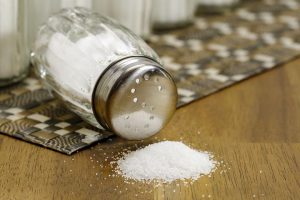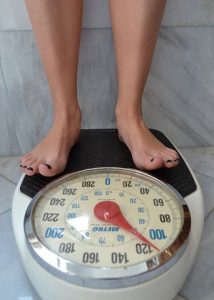Today, let’s look at the latest findings linking salt to being overweight. There is more than one recent study that suggests that salt is a potential cause of obesity so, of course, helpful health watchdogs jumped on the chance to take one more thing away from us. Their red flags could lead you to assume salt is the lone reason that you haven’t been able to lose weight no matter what you try, but don’t be so quick on the draw. It isn’t that the research should be ignored, but let’s sort out the facts on dietary sodium.
First, the Findings

Studies show that high-sodium diets encourage fat cell growth, and suggest that sodium can be linked to obesity and difficulty loosing weight.
A 2015 study on salt and obesity found that subjects across a range of ages who consumed high levels of salt had higher body fat mass. Some have speculated that people who are overweight eat more overall and, therefore, have more of a chance of working sodium into their diets. However, as recently as 2014, FOX News reported on research that linked salt to obesity in teens. The findings in this particular study included the fact that it did not matter how much food they ate. The most overweight kids were the ones who consumed the most sodium period which, BTW, averaged 3,300 to 3,400 mg per day–more than twice the recommended amount. Neither of these studies looked at why salt and obesity are linked, but Dr. Haidong Zhu, who led the study on sodium and teen obesity, referred to animal studies that showed high-salt diets promote fat cell growth.
Salt is Essential

Salt is essential for many body functions. Additionally, reducing salt intake doesn’t always lower blood pressure.
It is not prudent or healthy to go cold-turkey on the sodium, even if you’re having trouble losing weight. Harvard Health advises that you can’t live without salt. It helps your body sustain a good fluid balance plus, as an electrically charged molecule, it is vital for the transmission of nerve impulses, and sodium is also involved in contracting and relaxing your muscle fibers. People with hypotension need salt to help keep their blood pressure in the normal range. And, for all the studies that paint a picture of salt as Satan, Authority Nutrition says there are numerous studies with results showing that too little salt can cause health problems including increased cholesterol and increased risk of death in patients with Type II Diabetes. One study even found that a low sodium diet caused insulin resistance, which is a primary cause of obesity. (!) That means that, though too much salt in your diet can interfere with weight loss, not enough can keep you from losing weight, too.
So…How Much Salt Do You Need?
Not even the authoritative resources have been able to pinpoint how much salt is a healthy amount without being too much. With the USDA saying no more than 2,400 mg and the American Heart Association saying 1,500 mg, at least we have a range of between 3/4 and 1 full teaspoon of salt per day. However, the Academy of Nutrition and Dietetics cautions against putting one general number on recommended sodium intake. The Academy understands that everyone’s bodies are different and that a life-saving low-sodium diet for one person could be detrimental to another.

Himalayan pink salt, sea salt, and similar types of unrefined salts add trace nutrients to the diet that are beneficial for your health.
Unfortunately, that doesn’t really answer the question of how much salt you need. This is another one of those times when it is helpful if you know your body and know how to listen to it. Start with your blood pressure. If it is high, lowering your salt intake can help lower blood pressure. Go for an entire day without dashing the shaker over your food and, just for this one experimental day, try to eat low sodium foods such as fresh (not processed or pre-packaged) foods like vegetables but including fresh meat, too. Take note of how you feel overall. If salt has been interfering with your health, that should not be a tough one to gauge. If you feel great after your salt-limiting experiment and your blood pressure reading drops, it is definitely an indication that you belong on the lower end of the 1,500 to 2,400 mg scale.
On the other side of the coin, if you have low blood pressure, conducting the same experiment could have the opposite effect. Going low-sodium for a day or more might make you feel weak and fatigued, could interfere with your vision, and could produce cold sweats, dizziness, and even nausea. Those results are not a license to eat unlimited salt, but they do indicate that you can settle somewhere closer to 2,400 mg of salt per day.
In the end, you just need to find your personal salty sweet spot and take the studies with, well, a grain of salt.

